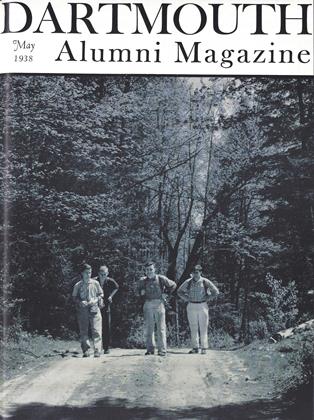President Hopkins delivered the annual Founder's Day Address at the University of Virginia on the morning of April 13 and on the same day spoke briefly at the grave of Thomas Jefferson in Monticello. In speaking at the exercises which marked the 195 th anniversary of Jefferson's birthday, the President joined a distinguished list of Founder's Day speakers, among whom in recent years have been President Hutchins of the University of Chicago, the Honorable Bainbridge Colby, President Dodds of Princeton University, and President Bowman of Johns Hopkins University.
President Hopkins' address, entitled "The Shadow of a Man," took its theme from the saying of Ralph Waldo Emerson that an institution is the lengthened shadow of one man, and went on to point out how true this statement is of the University of Virginia and Thomas Jefferson. From a consideration of Jefferson's love of truth and goodness as mirrored in the University today, Dartmouth's leader progressed to the discussion of education's aims and functions in general and declared that although educational values must necessarily be variable according to time and circumstance, "it becomes essential periodically for those of us associated with institutions of higher learning to pause and, in contemplation of our task, to assure ourselves that we are relating education to life."
There is no responsibility upon higher education to protect stereotypes of public opinion, he asserted, for "it is subversive of the whole philosophy of education to argue for established beliefs against convincing evidence that these should be modified or displaced." The primary goal of education, he said, "is cultivation and development of our mental powers to the end that we may know truth and conform to it."
President Hopkins once again attacked the professionalized point of view, "with its resulting tendency to generalize in regard to life as a whole from limited and specialized phases of life," and stated that "the great weakness of the professionalized point of view is that it fails to recognize that no fact is unrelated to other facts, and that final truth is found in the relationship of all facts, and there alone." The finding of truth would also be furthered, he said, if there were greater opportunity today for that reflective spirit and those periods of purposeful meditation through which alone well-balanced judgment can be formed.
"Gigantic forces are at work within the world," the President declared, "the effects of which cannot be foretold but the power of which must be got under control and given direction if we are to avoid new dark ages. The preservation of civilization is dependent upon widespread acceptance of principles under which these forces shall be applied for the common good. The presentation of the problems and the securing of the acceptance of these principles is a primary task of education. The method must be by persuasion if we believe in democracy. We need to drop expectation of miracles and of supermen and to reflect more and more on the fact that civilization has developed largely through the honesty of purpose and the intelligence of effort of normal men, subject to the control of disciplined intellectual processes.
"Leadership unsupported and unrestrained by intelligent followers may become either a sterile or a dangerous thing. We need in our institutions of higher learning to recognize the fact that a constituency capable and discriminating in its choice of leadership is as indispensable to a democracy as is a qualified group of leaders. We need to define our objectives in social organization less in terms of producing men of mastery and more in terms of producing men of influence."
 View Full Issue
View Full Issue
More From This Issue
-
 Article
ArticleDartmouth in the Dictionary of American Biography
May 1938 By WILLIAM A. ROBINSON -
 Article
ArticleGradus Ad Parnassum
May 1938 -
 Sports
SportsFollowing the Big Green Teams
May 1938 By Bob Haslam '39 -
 Article
ArticleFive Decades of Engineering
May 1938 By MILBURN MCCARTY JR. '35 -
 Class Notes
Class NotesClass of 1918
May 1938 By Allan C. Gottschaldt -
 Class Notes
Class NotesClass of 1910
May 1938 By Hap Hinman







